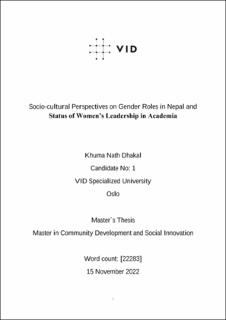| dc.description.abstract | This study is mainly concerned with how the gender-based social practices of Nepalese society pose challenges to women’s leadership in academia and how women leaders in academia deal with gender-based roles prevalent in Nepalese society in their leadership practices. As the study required a detailed understanding of the sociocultural concepts toward women and their status in Nepalese society and the condition of women’s leadership in academia, it uses a qualitative approach and demonstrates the phenomenon including the real experiences of women leaders in academia in Nepal. Further, it is focused on finding the experiences and strategies on how women leaders in academia deal with gender-based practices of Nepalese society in leadership practices so it uses in-depth interviews with seven women leaders who were purposively selected from different higher educational institutions in Kathmandu, Nepal. The empirical data is coded and developed into different meaningful themes and systematically presented under those themes. Further, the findings are discussed with reference to the related literature in the area and theoretical bases of social constructionism and social dominance theory.
The study shows that patriarchal social norms in Nepalese society have given the way to gender discrimination. The social practice that the man is head of the family has created a clear hierarchy as males are superior and women are the inferior or subordinate group. Socioculturally rooted stereotypes and male hegemony have restricted women in various social activities and discriminatory gender-role practices limited them in household chores. Further, the study demonstrates that such sociocultural concepts and discriminatory gender-role practices in Nepalese society have challenged women’s leadership in academia. As women get fewer opportunities in a male-dominated social setting, the underrepresentation of women’s leadership in academia is a crucial issue. Besides, due to the concept of masculine leadership traits, women are considered less capable of leadership roles. The social concept of women as solely responsible for household work and family care has added a burden to their professional development and career goals. Although the challenges, women leaders in academia seemed confident in their leadership roles. Their activities as role models could be an inspiration for other women aspiring to leadership positions in academia in Nepal. Their advocacy for gender equality in the community is significant for bringing a sense of gender equality from the grassroots level. Their involvement in the different professional forums helps them share their experiences and get collective strengths for equal opportunities. | en_US |
